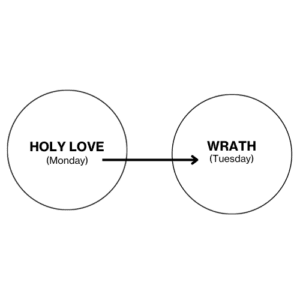If I’ve heard it once, I’ve heard it a thousand times: “Why does Jesus seem nicer than the God of the Old Testament?”
Have you heard this before? Or maybe said it yourself? When I get asked that question, I typically respond by pointing out that the God we read about in the Old Testament is actually much more loving than we give Him credit for. And if you’ve been tracking with our Revelation series, you’re beginning to see that Jesus is, to the modern Christian’s surprise, much more wrathful than we may have previously imagined.
Let’s look at Revelation 19v11-15:
“11 Then I saw heaven opened, and behold, a white horse! The one sitting on it is called Faithful and True, and in righteousness he judges and makes war.”
Okay, clearly this is Jesus. The same man from Nazareth that welcomed little kids into his arms is depicted here as riding in on a war horse intent on, well, not exactly welcoming little kids into his arms. Let’s read on.
“His eyes are like a flame of fire, and on his head are many diadems, and he has a name written that no one knows but himself. 13 He is clothed in a robe dipped in blood, and the name by which he is called is The Word of God. 14 And the armies of heaven, arrayed in fine linen, white and pure, were following him on white horses. 15 From his mouth comes a sharp sword with which to strike down the nations, and he will rule them with a rod of iron. He will tread the winepress of the fury of the wrath of God the Almighty.”
Far from distancing himself from an Old Testament God of wrath, here Jesus is the agent of God’s wrath. He is the one that will tread the winepress (an Old Testament image meaning to carry out the wrath of God). What you won’t find in this chapter, in other words, is Jesus begging his Father in heaven to let him take the “Milk and Honey Ice Cream Truck” to earth instead of a war horse. The Son isn’t protesting this at all.
In fact, he seems eager to ride in with the sword. I can’t emphasize this enough: The Father and Son, along with the Spirit, are completely united in their mission to bring wrathful judgment to earth.
And that’s really good news.
Talk to somebody, anybody really, about the love of God in the church today, and odds are, you will see a warm smile begin to form on their face. We love to talk about God’s love. We sing songs about it; we read books about it; we might even get a tattoo about it. But bring up the subject of God’s wrath, and that smile quickly turns into a nervous chuckle. For many Christians, we simply don’t know what to do with God’s wrath.
When’s the last time you heard a song about God’s righteous, furious anger on KLove?
How many tattoos of a Revelation 19 Jesus do you see on people’s forearms?
I think you get the point. All of this is very unfortunate. Why? Because God’s wrath is the ultimate proof of his love.
Yes, you read that right. Let me explain with some fancy theological lingo (that you should totally use at your next family brunch).
In talking about the attributes of God, in other words, who He is, theologians typically split them up into two categories: essential attributes and contingent attributes. Stick with me for a bit, because the payoff in understanding the difference between these two is massive.
Essential attributes are things true of God eternally. Said a different way, these are things, or you could say characteristics, that have been true of God forever. They were true of Him before creation, they have been true of Him after creation, and will be true of Him forever–well into the new creation.
Guess how many essential attributes God has?
There’s actually just one (some theologians might disagree with me; I respect their right to be wrong 😉). Can you guess what it is?
It’s this: Holy Love.
Not just love, but a holy love, one that is completely and totally pure, undefiled by any false motives or selfish ambitions. That was true of God before creation, and it’s remained true of Him since.

Jesus mentions this in John’s gospel when he says that the Father loved him (Jesus) even before the foundation of the world (John 17v24). If you were somehow able to make it back in time to before Genesis 1v1, do you know what you would find? You would find a God of holy love.
This is why later in one of his letters John can write, “God is love” (1 John 4v16). Love isn’t just something God does, it’s who He is.
Alright, how are we doing? We tracking so far? Because here’s where things get interesting. While God has been “holy love” for eternity past before creation, He decides to do something: create. This God of love pours out life (what the best Fathers do) into His creation, inviting it to share in His life-giving love. But you know what happens next. His kids, those invited to live in the shadow of His love, turn their backs on Him continually, rejecting His love. This rejection brings sin, pain, and suffering into a world created by a holy and loving God. What do you expect God to do? How do you expect Him to act?
Question: What happens, for you parents reading this, when your kids repeatedly reject your love and disobey you? What happens when they show you, time and time again, that they have absolutely no regard for your rules and values? Do you reward them with ice cream? No, if you are indeed a loving parent, something will be activated in these moments, and it’s not a performance bonus. It’s your wrath. Additionally, it’s not only what your kids do that elicits your wrath, it can also be because of what other people do to your kids.
It’s no different with God. While there are key differences between God’s wrath and our wrath (for example, his wrath is always activated justly, never without reason), at least one similarity exists: it’s real wrath! Whenever you read in the Bible that God gets “angry” or that his “wrath” burns against someone, it’s not there for show. It’s real!
I’m glad you asked! Some might imagine God’s wrath having a relation to God’s love like we choose different outfits for Monday and Tuesday. He’s loving one day, wrathful the next:

Contrary to this idea, God’s wrath, biblically speaking, is inextricably tied to His love. Put very simply, His wrath gets activated because of His love. Which is a very different picture from the one above. This means that God in His wrath doesn’t ever stop being love. It’s the love driving the wrath.

This is what we mean when we talk about a “contingent attribute” of God. It is something that is true of Him because of specific circumstances. When we talk about the wrath of God, in other words, we aren’t talking about something that has been true of Him for all of time. We are talking about something that is true of Him because something has happened (in this case, sin). This is why we never find a statement in the Bible like, “God is wrath.” It simply wouldn’t be true. God is not wrathful in the same way that He is loving. God’s wrath is contingent—it depends—upon His love.
How we doing?
This is where the parenting analogy once again proves helpful.
One could argue that if a parent’s “wrath” is never activated, whether it’s due to something their kid did or something that was done to their kid, they would not be a loving parent. Is it horrifying when a parent flies off the handle and gets too angry too often? Yes. But it might be more horrifying when a parent grows indifferent to the behavior and/or suffering of their kids.
Elie Wiesel, author and Holocaust survivor, famously said, “The opposite of love isn’t anger, it’s indifference.”
I think that’s beautifully said and extremely biblical. A God of indifference would not be a God of love because real love gets upset when the object of that love is in pain. Real love requires real wrath.
Throughout the book of Revelation, we see these two attributes of God—his holy love and wrath—in nearly every chapter and verse. It is God’s holy love for His creation that drives the plot of the entire book. And His wrath gets activated when that same creation is in disarray due to the Dragon, his beasts, and sin.
Imagine for a moment getting to the end of the story and hearing God say, “I actually don’t care that things on earth have gotten this bad. Things up here in heaven are pretty good. Therefore, I’m good and don’t need to intervene.”
Maybe some other god would think like that, but ours—a God of eternally holy love—cannot stay at a distance. His love requires that He do something and intervene, even if it gets messy, even if lives are lost, even if things get worse before they get better.
And that’s good news.
test test